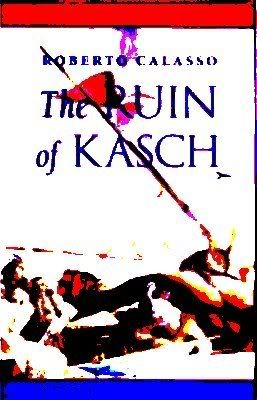A Book That Kicked My Ass

Roberto Calasso's The Ruin of Kasch was published in 1983 in Italy. The English translation hit the Kelknap imprint of Harvard University Press in 1994.
The book is written in an aphoristic style, although the aphorisms therein aren't that short, and sometimes aren't that memorable. I'd guess the book is usually stocked in the history sections of bookstores, but it could it easily turn up in philosophy, literature or anthropology. The prose, in English, is some of the smoothest and meatiest I've come across in awhile. Here's a typical passage from the book, this one concerns Louis XV:
"We shall never with certainty know much about his licentiousness, just as we shall never with certainty know much about his childish games. But one account tells us that, when he was seven, his courtiers entertained him by filling a vast hall with sparrows and then suddenly releasing some hawks, which mutilated the little birds with their sharp beaks. According to another account, 'The king had a white fawn that, since he had fed her and raised her himself, would only eat from his hand and loved him very much. He had her taken to La Muette and said he wanted to kill her. He chased her off, fired at her, and wounded her. The fawn dragged herself toward him and nuzzled him. He again had her placed at a distance, shot at her a second time, and killed her. The act seemed very cruel.'"
And here's another:
"Within Chinese society, within all societies, the park of the Son of Heaven once epitomized all nature in miniature. Now all nature is our park, and we do not know what it epitomizes."
The book contains over forty chapters, varying in length from just a few to a few dozen pages. These chapters are full of anecdotes, journal entries, all manner of philosophizing, anthropological and economic inquiries, and good old fashioned story telling. It would seem that Calasso disregards a hard and fast distinction between "History" and "Literature." And he doesn't see much of a point abiding by any chronology or linearity. Someone asked me to sum the book up in ten words or less and I said: "The origins of Modernism from the French Revolution."
But that doesn't really do the book justice.
It basically starts out as a biography of Charles-Maurice de Talleyrand, a French diplomat who worked alongside Napoleon Bonaparte. Calasso regards Talleyrand as being very in touch with the times, very much with the zeitgeist. He and chalks up Talleyrand's success to his ability to negotiate without ever standing on one firm principle. His outstanding achievement was holding no scruples.
The life of Talleyrand isn't told in typical biographical fashion, and is intercut with first hand descriptions of the places Talleyrand frequented, and anecdotes relating to the times from the likes of Goethe. From Talleyrand, Calasso moves on to the books namesake, the legend of the ruin of Kasch. It's a damn good story, and I'm not about to do it the disservice of relating it here, but let's just leave it at it being a proto- Sheherazade tale with a larger scope and nastier implications. Afterwards, there's a good deal of writing about sacrifice, and its development along with society from the most distant, to the most recent. The last third of the book seems to examine the advent of bureaucracy, capitalism, tyranny and psychosis. Worldwide, culminating in an Indochine Hell on Earth.
Or maybe not. Calasso leaves it to you to connect the dots, and I'm never quite sure where he's really laying his emphasis. In one section, we're told about an episode involving Goethe, ending with him saying "Damn, I got drunk for nothing!"
Whenever I read a book, my mind usually splits into three different parts. . . or, better, it adapts itself into a mode wherein it takes on three different tasks. The second task is the actual reading of the book, essay, poem, etc.. The second task has my mind adding what is being read to what has been read. The third would be the situating of a space for the end of the book, a space that excludes some possibilities and allows for others. . . a sense of where it all is going.
The Ruin of Kasch completely confounded this three-fold task that I call reading. I hadn't had such trouble reading through a piece since I tried reading On the Genealogy of Morals stoned, about ten years ago. I plan on re-reading it in February, and seeing what I'm able to take away from it.
When's the last time a book's kicked your ass?